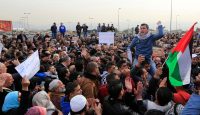
Shift on Syrian Constitution Could Help Assad Survive
In late March, US Secretary of State John Kerry announced while meeting with Vladimir Putin in Moscow that the US and Russia would work together to draft a new constitution for Syria with an August deadline. No further official information has been given about this plan, but the timing of the announcement and deadline marks a shift in the terms of the Syria peace talks – namely, that a true transitional period might no longer be endorsed by the international powers involved in the conflict. As the International Syria Support Group (ISSG), co-chaired by the US and Russia, meets again in Vienna, this makes it even more likely that President Bashar al-Assad would remain part of any new Syrian government.… Seguir leyendo »



